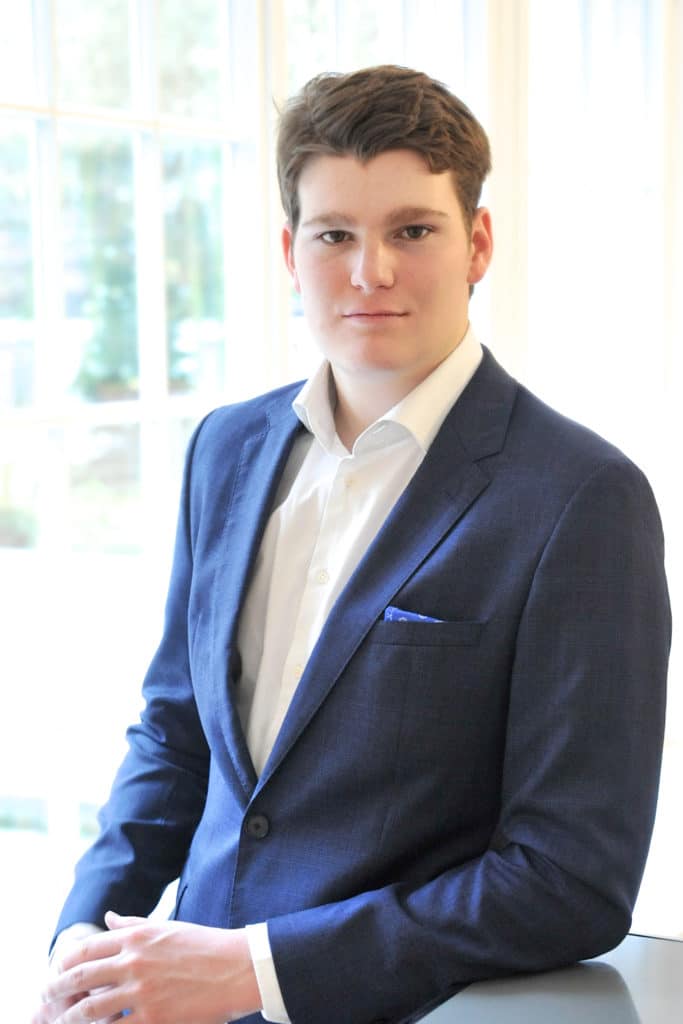
Promoting young talent to combat the shortage of skilled workers
The acute shortage of skilled workers is squeezing many sectors of the economy - including the construction and real estate industry. The lack of skilled workers is also noticeable at the Gröner Group.
Gröner Group relies on the dual study program
A quick glance at the job ads is enough to know: Architects, construction managers, project managers, structural engineers or TGA planners are in demand and hard to find. This is precisely what industry associations such as the GdW Bundesverband deutscher Wohnungs- und Immobilienunternehmen (Federal Association of German Housing and Real Estate Companies) report, identifying the technical field and property management in particular as problem children. They therefore advise employers to make themselves interesting, especially digitally, and to look for personnel early on. The right concept is important, they say; target-group-specific online campaigns are suggested and, in the course of this, the recruitment of junior staff who are digitally savvy.
According to the study, the targeted approach to prospective project developers is successful through the advertising of training positions and through dual courses of study. The trend toward the latter is confirmed by the Federal Institute for Vocational Education and Training (BIBB): More and more companies are offering training positions for dual studies. While a total of around 18,000 companies participated in 2004, around 51,000 cooperating companies (or locations) were counted in 2019. Overall, the number of dual study programs has more than tripled since 2004 from around 500 at the time. The number of students has risen from 41,000 to over 108,000.
As before, the engineering and economics disciplines have the largest number of degree programs on offer, each with around 600. Compared to the overall offering, these together account for just over 70 percent of all offerings.
The Gröner Group also relies on the dual study program, as there are already five students pursuing this training path and another student will join them in the fall. Ricky Engels, personnel officer of the Gröner Group: “After the experiences with our dual students and with a view to the future, I think this is the right approach to counter the shortage of skilled workers. We train our own project developers and managers and give them the CG DNA along the way. In this way, we can have a significant influence on the direction of education right from the start and convey key topics and future trends. Picking up and supporting students before they graduate is a legitimate as well as effective way to counteract the shortage of skilled workers.” A logical conclusion from the HR specialist’s point of view, because “finding external graduates is becoming increasingly difficult. These are often already tied to other companies by working student jobs and often don’t make it onto the job application market after graduation.”

In the Interview:
Johann Weitzel
Dual student at the Gröner Group
Auch ein Interview mit Johann Weitzel (JW), Dualer Student in der Hauptniederlassung der Gröner Group in Berlin, bAn interview with Johann Weitzel (JW), dual student at the Gröner Group headquarters in Berlin, also confirms this: Those who choose this training path benefit twice over by combining theory and practice.
How did you decide to start a dual study program and then at Gröner Group?
JW: The dual study program is a contemporary training model in which a student can combine practical work with theoretical expertise. For me personally, this combination was much more interesting compared to a normal apprenticeship, because it gave me the chance to complete a degree with a “bachelor’s degree” and a practical apprenticeship at the same time. Of course, it is possible to complete both in succession, but then it takes much more time. When I started at the former CG Group four semesters ago, I was given the opportunity to switch to the Gröner Group and became the first dual student in the company.
Looking back: Was this the right decision?
JW: I am very happy with this way, on the one hand regarding the company, but also my university. I study at the IUBH International University of Applied Sciences in Berlin and decided on the model of going to university on Mondays and Tuesdays; Wednesday to Friday is then working time in the office. Alternatively, there was the possibility to alternate work and study time on a weekly basis, but for me the first model fit better. This way, I’m always involved in the work topics and can also help shape my own projects and complete my tasks. If you don’t work for a week, so much happens; you miss out on a lot and can’t continue your own topics throughout.
How long does the study take?
JW: The dual study program ends with a bachelor’s degree after seven semesters. Normally, this degree is achieved in other courses of study after six semesters. Because of the combination of work and study, it’s not possible to cover all the material, so the study time is extended. At the end of the program, I’ll be 21 years old – so one more semester won’t matter.
What practical experience already exists?
JW: First I was in the team of board officers and helped out here and got to experience the issues of the board and management very closely. Now I’m in project development/project management. We are in charge of the project in Kleine Eiswerder Straße in Berlin with about 16,000 sqm of living space and a total development volume of 108 million. This is a really big and exciting project. Soon we will start with the excavation and that means for me to live through the project with all its stages. At every stage, the question arises “What do you have to pay attention to?” It’s great for me to be able to work with my project manager, because she has already successfully completed a project in Berlin with Rigaer Straße (Carré SamaRiga) and is a great colleague. She can explain very well and so the practical part in the company is a lot of fun, because I notice every day how know-how is added, how I myself progress and learn. My work is useful and I, as a young professional, am appreciated – all in all, it’s an educational and positive experience.
How can you imagine the dual studies – do the topics in theory at the university come parallel to the work?
JW: The course itself is a normal business administration course with a focus on real estate management, which means that in the first semesters we had the basics such as business administration, statistics, business mathematics, economics, cost and performance accounting, financial statements, etc. But now we are going more into the topic-specific areas such as real estate economics or construction law, and just in the current semester we are continuing with project development and financing. We’re getting more and more into real estate topics, which I find totally exciting because you can concretely combine theory with what you experience in practice. For example, since we want to start digging the excavation pit for the construction project in Kleine Eiswerder Straße soon, the topic of construction start notification came up, i.e. how far in advance do you have to give notice if you want to start building. At university, we were taught public building law and the Berlin Building Code, which states that you have to notify us one week in advance that you want to build, and I was able to use this knowledge here.
What tips do you have for those who are now interested in a dual study program?
JW: When I talk about myself personally, I can only say that the internships I did beforehand, for example with an architect or on a construction site, were very helpful. Through my parents’ work in the real estate sector, I saw a lot, was out and about on construction sites early on, and was thus able to pick up a lot of knowledge. It’s great when you’re close to the profession you want to pursue. That way, you can find out where your talents and interests lie.
At the beginning, the difficulty with the dual study program was that there were many prospective students, but the number of companies that accepted dual students was not very large. That’s a shame, because in principle it’s a very effective way for a company to train young people from the start of their careers to meet their needs. I find it all the better that this is currently changing in the industry and that the Gröner Group is positioning itself more broadly in this regard. I can only recommend the dual study program to everyone, even if it is not always easy to study while working, it is worth it!
An opinion from practice that speaks for itself. The Gröner Group trains dual students at the locations Berlin, Leipzig, Karlsruhe and soon also Cologne with the focus on real estate management, real estate project management, real estate business and asset management. “Dual students in combination with other trainees for later career as project assistants, are ideal for a healthy promotion of young talent,” says Ricky Engels.
Insgesamt stehen die Zeichen im Unternehmen verstärkt auf Ausbildung: Neben 18 Werkstudenten werden 14 Overall, the company is increasingly focusing on training: In addition to 18 working students, 14 apprentices are being trained in various areas throughout Germany. It will take some time until all of them have fully arrived in the profession, but the signs to fight the shortage of skilled workers from within the industry are set – within the Gröner Group.
Press contact
Eva Mommsen
T +49 30 7675948 1263
E presse@groener-group.com
Gröner Group AG
Bismarckstraße 79
10627 Berlin
